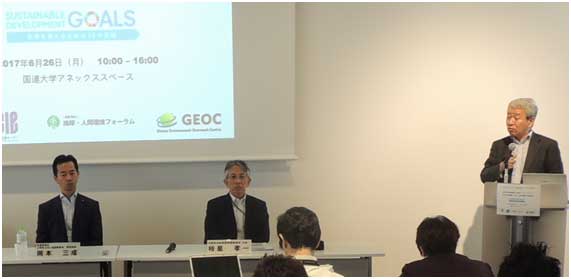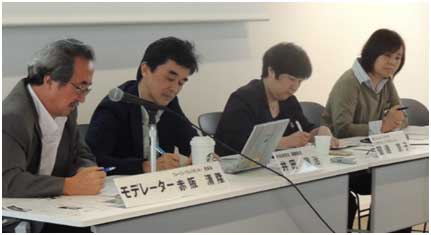Sustainable Development: Is Media –and the Business- Doing Enough?

ROME/TOKYO, Jun 29 (IPS) - Why and how should the media report on the Sustainable Development Goals (SDGs) in an engaging way? Can the SDGs deliver global development? And what are the role and challenges of business leadership in advancing these goals?
Tokyo has been chosen as the right scenario to pose these key questions and try to answer them in a way that helps achieve the 17 major SDGs that were agreed upon by the international community on XXX.
In fact, over 50 well known professional journalists, business leaders, and experts from various backgrounds, participated in the Japanese capital in a two-day workshops organised by the international news agency--IPS, with the support of the United Nations Foundation (UNF).
The workshops aimed to raise awareness and promote better understanding of the SDGs and discuss strategies together for greater and effective engagement by the participants in their implementation.
During the first day, a series of sessions were held under the title: "SDGs Tokyo Workshop for Journalists - Journalism and the Sustainable Development Goals--Working Together -- Why and how should the media report on the SDGs in an engaging way?"
On the second day, discussions and exchanges focused on the theme: "SDGs Tokyo Workshop for Business Leaders - Business and the Sustainable Development Goals (SDGs) Working Together – Can the SDGs deliver global development? Role and Challenges of Business Leadership in Advancing SDGs", 35 business leaders attended.
Hisashi Owada, a Board Member of the United Nations Foundation, underscored that the SDGs provide an" important policy framework for international cooperation aimed at promoting sustainable development across the world."
For her part, Kaoru Nemoto, Director, United Nations Information Centre, Tokyo emphasised the "role that needs to be played by media in transmitting information, thereby raising public awareness and encouraging behavioral changes."
Prof. Taikan Oki, Senior Vice-Rector, United Nations University highlighted policy and science interface where "media has a vital role to play in filling information gaps."

Mitsunari Okamoto, Member, House of Representatives and Secretary-General of the SDGs Promotion Committee of Komeito Party, Japan, emphasised that the SDGs match his Party's mission and therefore "cross-cutting measures are required for SDGs implementation."
Koichi Aiboshi, Ambassador, Assistant Vice-Minister/Director-General for Global Issues, Ministry of Foreign Affairs, Japan, stressed that the government "will bolster its efforts to raise the public awareness, monitor progress and mainstream SDGs implementation in its policies."
He also informed that the Japanese Government is preparing for review of Japan's SDGs implementation at the United Nations High Level Political Forum to be held in July 2017 in New York.

He stressed the importance of developing partnerships and facilitating policy and institutional transformation for reducing marine pollution, minimising the impacts of ocean acidification and enhancing autonomy of small island developing states and artisanal fishermen.
Prof. Hideki Ishida, President, Earth Village Laboratory, Japan, highlighted the "importance of supporting local processes to raise autonomous resource management in island and coastal communities."
For her part, Naoe Yakiya, Director, Japan Relations Office, United Nations World Food Programme (WFP), recommended to "explore closer partnership between the UN and media" to deliver and share information particularly at the forefront of field operations.
Yumiko Watanabe, Chairperson, KIDS' DOOR underlined that Japan is "ranked at the bottom group of poverty rate including poverty in children." She called for policy and institutional reforms to provide equal opportunities and provide better social safeguarding for children who endure economic difficulties.
Katsuji Imata, Steering Committee Member, Japan Civil Society Network on SDGs raised concern about the "growing social gaps and unsustainable pattern of lifestyles" and called for urgent and concerted actions to implement the SDGs.

He also stated that information is a vital tool for people to learn from each other and build a sustainable society for which media must continue to play a vital role.
Tetsuji Ida, Senior Staff Reporter, Kyodo News Agency introduced his work on research journalism and stated that it is a challenge to expand SDGs media coverage and facilitate policy and behavioral changes.
Kyoko Gendatsu, Executive Producer, NHK Enterprise introduced diverse TV programs on SDGs related issues and her endeavors to link news and information providers and viewers in SDGs context.
Miyuki Hokugo, News Bureau Desk, Asahi Shinbun stated that reporting on SDGs require different approaches. She also underlined that it is indeed essential to praise good practices while at the same time raise concerns over unsustainable patterns of businesses and activities.
A wide range of issues were addressed in the course of discussions at the Workshop on the first day which turned out to be productive with active participation and interaction between the attending media and the speakers.
The following captures the views expressed by the journalists:
• Comprehending sustainable development issues as an overarching societal agenda • Eliminating institutional compartmentalisation and promoting cross-sectoral approaches • Mainstreaming SDGs as a priority policy agenda • Setting concrete target and multiplying the multifaceted impacts • Exploring solutions suitable to characteristics and conditions of respective countries and communities • Promoting synergies among related SDGs and supporting them in a holistic manner • Producing stories and communicating these as our own • Promoting continued media coverage and reporting • Mainstreaming and standardising the effective media coverage and reporting on SDGs • Linking SDGs not just with social and environmental issues, but also with financial, economic, real estate and asset, and other market issues, reporting with a cross-cutting approach • Not just reporting and providing critiques, but reporting to praise and positively evaluate good practices, • Presenting negative and harsh evidence, warning the society with severe reporting, facing those who may encounter negative impacts by the reporting, reporting to criticise wrong doing/bad practices for better solutions, • Criticism is a mother of transformation and good practices,
The Workshops were held at the United Nations University (UNU) in Tokyo and were organised with support of the United Nations Information Center in Tokyo, the UNU, the Ministry of Foreign Affairs, Japan, Global Environmental Forum, Japan, Global Compact Network, Japan, the Japan Center for International Exchange and the Global Environment Outreach Center.
© Inter Press Service (2017) — All Rights Reserved. Original source: Inter Press Service

